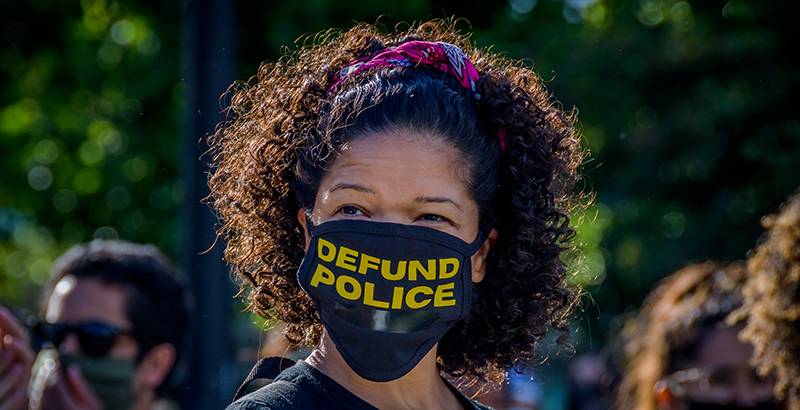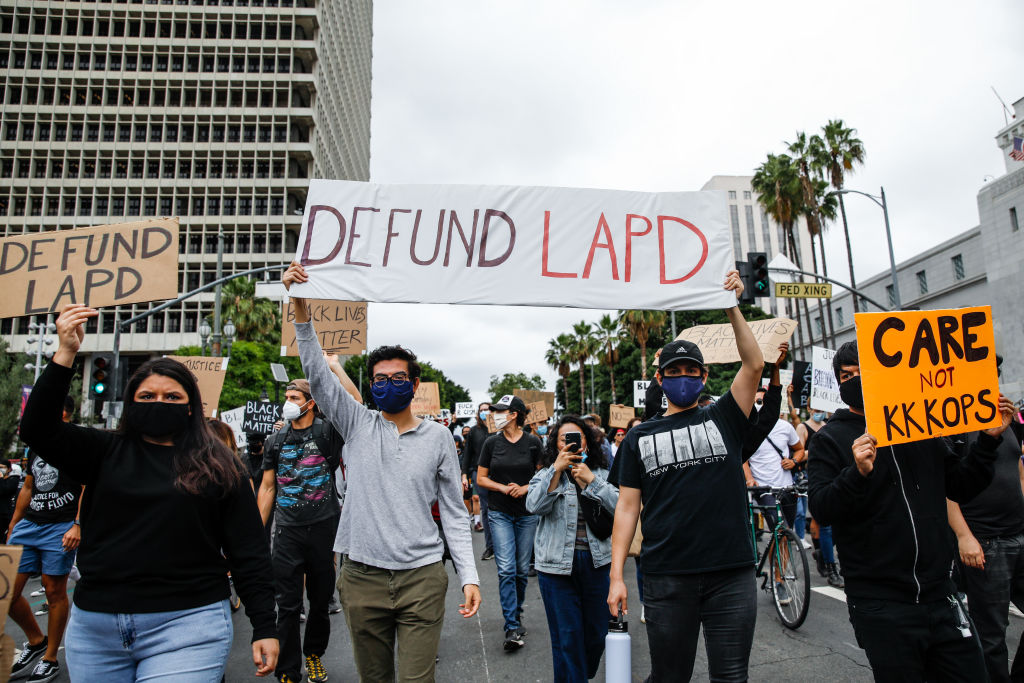‘Defunding the Police’ — and Shifting Resources From Law Enforcement to Schools — Gains Momentum in the Wake of Protests

Fueled by protesters’ calls to remake urban police forces in the wake of George Floyd’s killing, officials from New York City to Los Angeles are trying to steer funds once earmarked for law enforcement toward education.
While the efforts face several obstacles — a move to transfer $4 million from the police to schools in Hartford, Connecticut, failed Thursday — they have edged much closer to the political mainstream than they were just a few weeks ago.
New York City Council member Carlos Menchaca, a Democrat, wants to reallocate $1 billion of the police department’s budget, with a significant portion earmarked for city schools. He chided Mayor Bill de Blasio’s decision to cut education funding in response to the economic fallout brought on by the pandemic, especially given the minor reductions proposed for police.
Menchaca is not alone: Several council members are calling for a steep reduction to the police budget. New York City Comptroller Scott M. Stringer called on de Blasio to axe $265 million from the department annually for the next four years.
Menchaca said the city must restore funding for critical initiatives, including the Summer Youth Employment Program that has provided jobs to tens of thousands of teens and young adults each year. Most of those involved in the program hail from communities hit hardest by COVID-19, he said.
“Instead of preserving or bolstering this program, the mayor decided to eliminate it entirely, while barely touching the NYPD’s bloated $6 billion budget,” he said. “Having gone through the worst pandemic in American history and now experiencing the worst economic fallout since the Great Depression, we should be investing in education, housing and health care, not giving more money to a militarized and unaccountable police force.”
Council members will vote on the city’s budget by July 1, when it goes into effect.
Jedidah Pacheco, a junior in the New York City public school system who has participated in numerous protests since Floyd’s death, wants police removed from campus and its funding reallocated.
“Putting money into education is so vital,” Pacheco said. “It shows students that they matter.”
Across the country in Los Angeles, Mayor Eric Garcetti last week announced his intention to remove as much as $150 million from his city’s law enforcement budget so it can be invested “in jobs, in health, in education and healing,” with the money geared to better serving communities of color.
A 2019 Princeton University study found that black students faced a higher rate of in-school arrests and law enforcement referrals compared with their white peers. Based on an examination of federal data covering 32 million students across 96,000 schools, researchers found that the disparity only widens in counties with more racial bias.
School resource officers
The most immediate effect of the current push is likely to be felt in school districts that cut ties with local law enforcement. This is especially true in Minneapolis, where Floyd was killed May 25: The city’s public schools have already voted to remove “school resource officers” — armed law enforcement agents — from campuses.
The district was in negotiations for a new contract that would have cost $1.3 million annually for three years. Kim Ellison, chair of the school system’s board of education, does not know where the money will go but said it could be used for added counselors or an alternative form of school security — one that does not involve law enforcement on campus.
As for what her district might do with possible money rerouted from the Minneapolis Police Department itself, she’d like to see it used for restorative justice, which would benefit not only the district but the city at large, she said.
“When a fight breaks out in school and we separate the characters fighting but don’t resolve the issue — when school gets out, that same fight leaks out into the community,” Ellison said.
Portland Public Schools in Oregon also has done away with police at its high schools, and at least a dozen other districts are considering a similar move.
Despite calls to “defund the police,” as many protesters urge, the idea has received significant pushback.
Mo Canady, executive director of the National Association of School Resource Officers, said severe cuts could leave police departments ill-equipped to handle the robberies, domestic violence calls and burglaries they respond to on a daily basis.
“I’m all for additional resources for education and children’s services,” he said, but it does not have to come at the cost of local police budgets or by kicking law enforcement off campus. “We want all students to graduate from high school. Good SROs are a constructive part of that process.”

In Hartford, an effort to transfer funds from police to schools failed despite the support of two members of its city council. The push was embraced by Joshua Michtom, a public defender who joined the council in December as part of the Working Families Party, which he describes as a working-class coalition fighting for “a more just society.” He wanted to trim $9 million from the police budget and transfer more than $4 million to education.
Hartford Public Schools serve mostly poor black and Latino communities and had difficulty moving to online instruction during the pandemic because of a lack of devices and internet access for its 20,000 students. Michtom and fellow Working Party council member Wildaliz Bermudez wanted to see the money used to bolster technology, perhaps through the purchase of equipment or the creation of Wi-Fi hotspots throughout the city.
“Education is the biggest point of contact between city government and residents,” Michtom said. “It’s the place we have the greatest opportunity to make a difference. In a very poor city like ours, education is more than classes from 7:30 to 3. It’s meals, programs, social work support. It is our greatest — though still inadequate — tool to counteract the structural racism put on our residents, especially our kids.”
He and Bermudez also wanted more money for health and social services.
“We get together one day and hash it out, and today is that day,” Michtom said Wednesday afternoon as some 75 protesters stood outside City Hall, waving “BLM,” “Defund” and “Abolish” placards.
But they lost the fight early the next day. Michtom said the Hartford Police Department will see only a $1 million loss, with none of the money set aside for education.
“When government chooses coercion and criminalization over prevention and opportunity as the only way to ensure a safe community, it shows a lack of faith in its own people,” he said Thursday morning. “It sends the message that their poverty is not just an unfortunate circumstance but an inherent characteristic, and that the only remedy is to contain and control them.”
The push to reroute police funding might also face another hurdle: Officials in Salt Lake City and Madison, Wisconsin, say local government has no connection to schools, so there is no pathway to shift money from the municipality to education.
Kevin Robinson, a 36-year veteran of the Phoenix Police Department, believes that law enforcement officials will initially resist the cuts but ultimately will capitulate for two reasons: They might actually prefer to outsource services they struggle with — including those involving mental health — releasing them from liability in that area.
And they also don’t have the power to block such demands.
“We have a saying in the police department: ‘Everybody has a sergeant,’” he said, adding that mayors across the country are acting in direct response to their constituents’ cry for change.
Robinson, who retired from the force as assistant police chief in 2017, is now a full-time lecturer at Arizona State University’s School of Criminology and Criminal Justice.
He supports the idea of steering money toward youth, possibly in the form of afterschool programs, and said police departments have a unique opportunity to make positive change.
“People are clamoring for this,” he said. “I have never seen protests this large, this protracted and this diverse. Ever. That should tell everybody something. The smart police agencies are going to get out in front of that.”
Get stories like these delivered straight to your inbox. Sign up for The 74 Newsletter

;)
